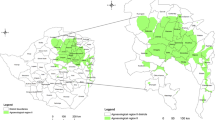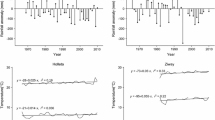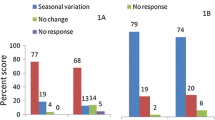Abstract
This paper investigates farmer perceptions of climate variability and change in rural North-west Ghana and compares with analyses of daily rainfall data (from 1960–2016) and monthly minimum and maximum temperature (1988–2014). Specifically, this study attempts to understand the following: (i) what does climatic data say about the nature of the past and current climate of North-west Ghana? (ii) what are farmer’s perceptions of climate variability and change? and (iii) how do analyses from climatic data match or and mismatch farmers’ perception of the climate? Statistical analyses and modelling of rainfall and temperature were performed, and the results compared with data collected through semi-structured questionnaire and qualitative interviews. The results from the farmer perceptions and analysis of climatic data largely disagreed. The only exception being agreement on increasing temperature. Specifically, farmers observed a shift in the start and end of the rainy season from March to June, and November to October respectively. However, the results from the climatic analyses showed variability in the start, end, and the length of the rainy season from 1960–2016. Even though farmers perceived changes in climate and climatic analysis showed variability, it is worth recognising that the two are problematic for farmers’ decision making. Therefore, to increase farmers′ resilience to climate variability and change, this paper suggests the following: (i) climate-smart agricultural practices such as high yielding and improved varieties of seeds must be made available to farmers at affordable prices- however, this paper argues that, the cultural aspects of the uses of crops must be considered in the provision of crops that are suitable to the prevailing climatic conditions, and (ii) the capacity of agricultural extension workers should be enhanced on climate variability and change, for example equipping them on analysis, interpretation, and application of climatic events so they can engage with farmers in a participatory pathway to deal with climate variability and change impacts.

Source: Author’s construct (Geographic Information System, 2019)

Source: Ghana Meteorological Agency (2016)

Source: Ghana Meteorological Agency (2016)

Source: Ghana Meteorological Agency (2016)

Source: Ghana Meteorological Agency (2016)

Source Ghana Meteorological Agency (2016)

Source: Ghana Meteorological Agency (2016)

Source: Ghana Meteorological Agency (2016)

Source: Ghana Meteorological Agency (2016)

Source: Ghana Meteorological Agency (2016)

Source Semi-structured Questionnaire (Doggoh village, 2016)

Source: Semi-structured Questionnaire (Tie village, 2016)

Source: Semi-structured Questionnaire (Doggoh and Tie villages, 2016)
Similar content being viewed by others
Notes
The village ‘analysts’ were selected by the village lead persons (two persons, male and female- that guided the research team).
R-Instat (A climate software application developed by the Africa Maths Initiative).
Please do note that the above results on farmers’ perceptions of climate variability and change only hold as at 2016 as these could change slightly now as the data was collected about 4 years ago.
Past in the context of this thesis refers to 25–30 years from 2016 when the fieldwork took place
References
Amadou, M. L., Villamor, G. B., Attua, E. M., & Traore, S. B. (2015). Comparing farmers' perceptions of climate change and variability with historical climate data in the Upper East Region of Ghana Ghana. Journal of Geography, 7, 47–74.
Antwi-Agyei, P. (2012). Vulnerability and adaptation to of Ghana's food production systems and rural livelihoods to climate variability. University of Leeds
Arbuckle, J. G., Jr., Morton, L. W., & Hobbs, J. (2013). Farmer beliefs and concerns about climate change and attitudes toward adaptation and mitigation: Evidence from Iowa. Climatic Change, 118, 551–563.
Asante, W. A., Acheampong, E., Kyereh, E., & Kyereh, B. (2017). Farmers’ perspectives on climate change manifestations in smallholder cocoa farms and shifts in cropping systems in the forest-savannah transitional zone of Ghana. Land Use Policy, 66, 374–381.
Ayanlade, A., Radeny, M., & Morton, J. F. (2017). Comparing smallholder farmers’ perception of climate change with meteorological data: A case study from South-western Nigeria. Weather and Climate Extremes, 15, 24–33.
Bryman, A. (2016). Social research methods. Oxford: Oxford University Press.
Burke, E. J., Brown, S. J. & Christidis, N. (2006). Modelling the recent evolution of global drought and projections for the twenty-first century with the Hadley Centre Climate Model. Journal of Hydrometeorology.
Christensen, J. H., Hewistson, B., Busuioc, A., Chen, A., Gao X, H., I., Jones, R., Koli, R. K., Kwon, W. T., Laprise, R., V.M., R., Menendez, C. G., Raisanen, J., Rinke, A., Sarr, A. & Wheton, P. (2007). Regional climate projections. In: Solomon, S., Qin, D., Manning, M., Chen, Z., Marquis, M., Averyt, K. B., Tignor, M. & Miller, H. L. (eds.) Climate change 2007: the physical science basis. Contribution of working group I to the fourth assessment report of the intergovernmental panel on climate change. Cambridge: Cambridge University Press.
Codjoe, S. N. A., & Owusu, G. (2011). Climate change/variability and food systems: evidence from the Afram Plains, Ghana. Regional Environmental Change, 11, 753–765.
Collins, J. M. (2011). Temperature variability over Africa. Journal of Climate, 24, 3649–36666.
Dapilah, F. and Nielsen, J. O. (2019). Climate change extremes and barriers to successful adaptation outcomes: Disentangling a paradox in the semi-arid savannah zone of northern Ghana, Ambio.
Dapilah, F., Nielsen, J. O., Friis, C. (2019). The role of social networks in building adaptative capacity and resilience to climate change: a case study from northern Ghana, Climate and Development.
Derkyi, M., Adiku, S. G. K., Nelson, V., Dovie, B. D., Codjoe, S. & Awuah, E. (2018). Smallholder farmers’ perception of climatic and socio-economic factors influencing livelihoods in the transition zone of Ghana. AAS Open Research, 1.
Diallo, I., Sylla, M. B., Giogi, F., gaye, A. T., & Camara, M. (2012). Multi-model GCM-RCM ensemble based projections of temperature and precipitation over West Africa for the early 21st Century. International Journal of Geophysics.
Dohmen, T., Falk, A., Huffman, D., Marklein, F., & Sunde, U. (2009). Biased probability judgment: Evidence of incidence and relationship to economic outcomes from a representative sample. Journal of Economic Behavior & Organization, 72, 903–915.
EPA (2000). Climate change vulnerability and adaptation assessment of the agricultural sector of Ghana. Final report Accra Ministry of Environment Science and Technology
Fountaine, B., Roucou, P., & Monerie, R. A. (2011). Changes in African Monsoon region at medium -term horizon using 12 AR4 coupled models under the A1b emission scenario. Atmospheric Science Letter, 12, 83–89.
Gandure, S., Walker, S., & Botha, J. J. (2013). Farmers' perceptions of adaptation to climate change and water stress in a South African rural community. Environmental Development, 5, 39–53.
GSS (2014). 2010 Population and Housing Census District Analytical Report, Jirapa District. Accra, Ghana.
Habiba, U., Shaw, R., & Takeuchi, Y. (2012). Farmer's perception and adaptation practices to cope with drought: Perspectives from Northwestern Bangladesh. International Journal of Disaster Risk Reduction, 1, 72–84.
Horsefield, G. D. (2016). Investigating the factors that lead to the construction of gendered perceptions of climate variability and change of communal framers in agro-ecological zones II and III of Zimbabwe. PhD University of Reading
Hulme, M., Doherty, R., Ngara, T., New, M., & Lister, D. (2001). African climate change: 1900–2100. Climate Research, 17, 145–168.
Ingram, J. S. I., Roncoli, M., & Kirshen, P. (2002). Opportunities and constraints for farmers of West Africa to use seasonal precipitation forecasts with Burkina Faso as a case study. Agricultural Systems, 74, 331–349.
IPCC (2007). Climate change 2007: impacts, adaptation and vulnerability. Contribution of Working Group II to the Fourth Assessment Report of the Intergovernmental Panel on Climate Change. Cambridge University Press.
IPCC (2014). Climate Change 2014 : Synthesis Report. . In: Pachani, R. K. & Meyer, L. A. (eds.) Contribution of Working groups I, II and III to the fifth Assessment Report of the Intergovernmental Panle on Climate Change
James, R., & Washingston, R. (2013). Changes in African Temperature and Precipitation associated with degrees of global warming. Climate Change, 117, 859–872.
Joshi, M., Hawkins, E., Sutton, R., Lowe, J. & Frame, D. (2011). Projections of when temperature change will exceed 20C above pre-industrial levels Nature Climate Channge 1, 407–412.
Jung, G. & Kunstmann, H. (2007). High-resolution regional climate modelling for the Volta region of West Africa. Journal of Geophysical Research, 112.
Kolleh, J. B., & Jones, M. T. (2015). Rice farmers' perception of climate change and adaptation strategies in the Ketu North District of the Volta Region of Ghana. African Journal of Agricultural Research, 13, 782–791.
Kusakari, Y., Asubonteng, K. O., Jasaw, G. S., & Dayuor, F. (2014). Farmer - perceived effects of climate change on livelihoods in Wa West District, Upper West Region of Ghana. Journal of Disaster Research, 9, 516–528.
Ladislaus, C. B., Yanda, P. Z., & Ngana, J. (2010). Indigenous knowledge in seasonal rainfall prediction in Tanzania: a case of the South-western Highland of Tanzania. Journal of Geography and Regional Planning, 3, 66–72.
Laube, W., Schraven, B., & Awo, M. (2012). Smallholder adaptation to climate change: Dynamics and limits in northern Ghana. Climate Change, 111, 753–774.
Lawson, E.T., Alare, R.S., Salifu, A.R.Z., Thompson-Hall, M. (2019) Dealing with climate change in semi-arid Ghana: understanding intersectional perceptions and adaptation strategies of women farmers. GeoJournal.
Li, S., Juhasz-Horvath, L., Harrison, P. A., Pinter, L., & Rounsevell, M. D. A. (2017). Relating farmer's perceptions of climate change risk to adaptation behaviour in Hungary. Journal of Environmental Management, 185, 21–30.
Limantol, A. M., Keith, B. E., Azabre, B. A., & Lennartz, B. (2016). Farmers' perception and adaptation practice to climate variability and change: a case study of the Vea catchment in Ghana. Springerplus, 5, 830.
Maddison, D. (2007). The Perception of and Adaptation to Climate Change in Africa Policy Research Working Paper
Meehl, G., Stocker, T., Collins, W. D., Friedlingstein, P., Gaye, A. T., Gregory, J. M., Kitoh, A., Knutti, R., Murphy, J. M., Noda, A., Raper, S. C. B., Watterson, I. G., Weaver, A. J. & Zhao, Z. (2007). Global climate projections climate change 2007: The physical science basis. The Physical Science Basis.
Menapace, L., Colson, G., & Raffaelli, R. (2015). Climate change beliefs and perceptions of agricultural risks: An application of the exchangeability method. Global Environmental Change, 35, 70–81.
Minia, Z. (2004). Climate scenarios developed for climate change impacts assessment in Ghana. The Netherlands Climate Change Studies Assistance Programme (NCCSAP) Phase 2-Part 1. Environmental Protection Agency.
Minia, Z. (2008). Climate change scenario development. In: Agyemang-Bonsu, W. K. (ed.) Ghana Climate Change Impacts, Vulnerability and Adaptation Assessments. Accra: Environmental Protection Agency.
MoFA (2011). Agriculture in Ghana Facts and Figures 2010. Accra Statistics, Research and Information Directorate
Monerie, R. A., Foutine, B., & Roucou, P. (2012). Expected future changes in African monsoon between 2030 and 2070 using some CMIP 3 and CMIP5 models under a medium-low RCP scenario. Journal of Geophysics, 1984–2012.
Moyo, M., Mvum, B. M., Kunzekweguta, M., Mazvimavi, K., & Craufurd, P. (2012). Farmer perceptions of climate change and variability in semi-arid Zimbabwe in relation to climatology evidence. African Crop Science Journal, 20, 317–335.
Mubaya, C. P., Njuki, J., Mutsvangwa, E. P., Mugabe, F. T., & Nanja, D. (2012). Climate variability and change or multiple stressors? Farmer perceptions regarding threats to livelihoods in Zimbabwe and Zambia. Journal of Environmental Management, 102, 9–17.
New, B. H., David, B. S., Alois, T., Andries, K., Atanasio, M., Bernard, G., Caio, A. S. C., Dorcas, N., Masisi, E. K., Ernest, M., Francis, A., Hemed, S. J., K., A., J., Ebohang, B., Lubega, F., Marshall, L. M. & Robert, L. (2006). Evidence of trends in daily climate extremes over southern and West Africa. Journal of Geophysical Research 111.
Nguyen, T., Mula, L., Cortignani, R., Seddaiu, G., Dono, G., Virdis, S., et al. (2016). Perceptions of present and future climate change impacts on water availability for agricultural systems in the western mediterranean region. Water, 8, 523.
Nicholsen, S. E. (2001). Climatic and environmental change in Africa during the last two centuries. Climate Research, 17, 123–144.
Nyantakyi-Frimpong, H., & Bezner-Kerr, R. (2015). The relative importance of climate change in the context of multiple stressors in semi-arid Ghana. Global Environmental Change, 32, 40–56.
Ofori-Sarpong, E. (2001). Impact of climate change on agriculture and farmers coping strategies in the upper east region of Ghana. West African Journal of Applied Ecology, 2, 21–35.
Osbahr, H., Dorward, P., Stern, R., & Cooper, S. (2011). Supporting agricultural innovation in uganda to respond to climate risk: linking climate change and variability with farmer perceptions. Experimental Agriculture, 47, 293–316.
Patt, A., & Schroter, D. (2008). Perceptions of climate risk in Mozambique: Implications for the success of adaptation strategies. Global Environmental Change, 18, 458–467.
Roncoli, C., Orlove, S. B., Kabugo, M. R., & Waisw, M. W. (2011). Cultural styles of participation in farmers' discussions of seasonal climate forecasts in Uganda. Agric Human Values, 28, 123138.
Rowell, D. P. (2012). Sources of uncertainty in future changes in local precipitation. Climate Dynamics, 39, 1929–1950.
Sanderson, M. G., Hemming, D. L., & Betts, R. A. (2011). Regional Temperature and precipitation changes under warming. Philosophical Transactions of the Royal Society A, 369, 85–98.
Singh, C. (2014). Understanding water scarcity and climate variability: an exploration of farmer vulnerability and response strategies in northwest India, Unpublished PhD thesis. University of Reading.
Singh, C., Osbahr, H. & Dorward, P. (2018). The implications of rural perceptions of water scarcity on differential adaptation behaviour in Rajasthan, India. Regional Environmental Change
Stern, R., & Cooper, P. (2011). Assessing climate risk and climate change using rainfall data: A case study from Zambia. Experimental Agriculture, 47, 241.
Stern, R., Rijks, D., Dale, l. & Knock, J. (2006). Instat Climatic Guide, University of Reading Statistical Services Centre.
Tambo, J. A., & Abdoulaye, T. (2012). Smallholder farmers’ perceptions of and adaptations to climate change in the Nigerian savanna. Regional Environmental Change, 13, 375–388.
Taylor, J. G., Stewart, R. T., & Downton, M. (1988). Perceptions of Drought in the Ogallala Aquifer region. Environment and Behaviour, 20, 150–175.
Thomas, D. S. G., Twyman, C., Osbahr, H., & Hewitson, B. (2007). Adaptation to climate change and variability: Farmer responses to intra-seasonal precipitation trends in South Africa. Climatic Change, 83, 301–322.
Thornton, P. K., Jones, P. G., Ericksen, P. J., & Challinor, A. J. (2011). Agriculture and food systems in Sub-Saharan Africa in a 4 C+ world. Philosophical Transactions of the Royal Society, 369, 117136.
USDA. (2011). Ghana Climate Change Vulnerability and Adaptation Assessment. Washington DC: USAID Ghana.
Van de Geest, K. (2002). We’re manging!Vulnerability and response to climate variability and change among rural households in northwest Ghana, Unpublished MA thesis. the Netherlands: University of Amsterdam.
Van der Geest, K. (2004). We're Managing! Climate Change and Livelihood Vulnerability in Northwest Ghana, African Studies Centre.
Yaro, J. A. (2013). The perception of and adaptation to climate variability/change in Ghana by smallscale and commercial farmers. Regional Environmental Change, 13, 1259–1272.
Funding
This study was funded by the British Government under the administration of the Commonwealth Scholarships Commission (UK). The author was awarded a Commonwealth PhD Scholarship.
Author information
Authors and Affiliations
Contributions
This study was part of the author’s PhD thesis. He conceived of the study, formulated the research objectives, designed the methodology, collected the data, performed the statistical analysis, interpreted the data and wrote the reports.
Corresponding author
Ethics declarations
Conflict of Interest
The author reports no conflict of interest.
Ethical approval
This study was approved by the University of Reading Research ethical clearance committee.
Informed consent
The researcher obtained informed consent from all the participations before collecting data from them.
Additional information
Publisher's Note
Springer Nature remains neutral with regard to jurisdictional claims in published maps and institutional affiliations.
Appendix: An illustration of the criteria for stratifying the households into different wealth strata via wealth ranking exercise
Rights and permissions
About this article
Cite this article
Dakurah, G. How do farmers’ perceptions of climate variability and change match or and mismatch climatic data? Evidence from North-west Ghana. GeoJournal 86, 2387–2406 (2021). https://doi.org/10.1007/s10708-020-10194-4
Published:
Issue Date:
DOI: https://doi.org/10.1007/s10708-020-10194-4




